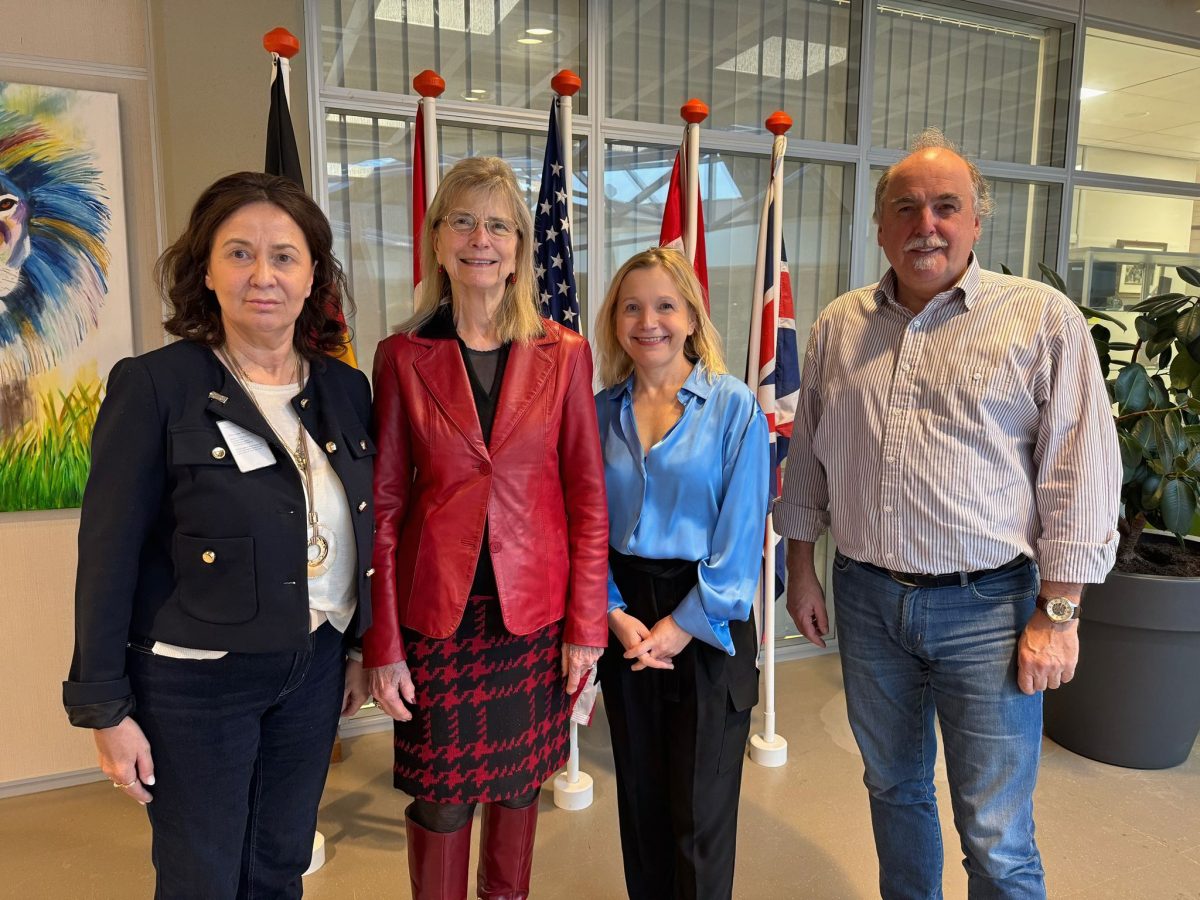By Beata Bruggeman-Sekowska
On December 9, a packed meeting at Heerlen’s Royal Theater became a rallying point against the 2030 closure of critical services at Zuyderland Hospital. Hosted by Theo de Groot of the Ziekenhuisalliantie and alderman Arlette Vrusch, the event brought together a wide spectrum of the community encompassing midwives, doctors, residents and politicians. A keynote was delivered by Volkskrant columnist Marcia Luyten. Mayor Roel Wever led the call for a full-service hospital and was praised for his unwavering dedication to addressing the issue.

From the left: alderman Arlette Vrusch and Theo de Groot of the Ziekenhuisalliantie photos: ©Beata Bruggeman-Sekowska
The meeting marked the next steps in the fight against plans to shut down essential services, including the ER, ICU, and birth center, in Heerlen. These closures would force pregnant women in Parkstad to travel to Sittard-Geleen for childbirth, caesareans, or emergency obstetric care. This follows the earlier loss of maternity services in Brunssum, Kerkrade, and the Vroedvrouwenschool, marking the definitive end of clinical obstetrics in Parkstad.

Roel Wever, mayor of Heerlen photos: ©Beata Bruggeman-Sekowska
Similarly, patients needing immediate critical care would also face challenges; for instance, a heart attack victim requiring rapid access to the ER or a trauma patient needing intensive care would experience life-threatening delays under the new centralization plan.
Parkstad: The Nation’s Most Disadvantaged Region
Parkstad, home to 255,000 residents—double the population of Sittard-Geleen—already struggles with high poverty rates, healthcare avoidance, more than average health problems and an aging population, as I pointed out in my article for the Dutch Volkskrant. Vulnerable groups such as single mothers are disproportionately impacted; nearly 1 in 5 children are born to single mothers in the region, twice the national average and many of these families live in poverty and debt. Despite having twice as many births and 100,000 more residents than Sittard-Geleen, Parkstad is now at risk of losing vital healthcare services.
Protests Against a Decision Made in Isolation
Protesters remain outraged by the lack of consultation with local stakeholders, including municipalities and general practitioners (GPs). An overwhelming 95% of local GPs oppose the decision, arguing that it fails to account for Parkstad’s unique healthcare needs. Frustrations extend to CZ, the health insurer strongly advocating for centralization, as well as Zuyderland’s decision-making processes.
A Deeper Problem: Real Estate and Financial Strain
Critics link these proposed closures to financial mismanagement stemming from the construction of the Orbis Medical Center in Sittard-Geleen in 2009. The Zuyderland hospital is still grappling with the fallout from the merger of the Orbis Medical Center in Sittard-Geleen and the Atrium Medical Center in Heerlen, which created the Zuyderland Medical Center. Orbis, which opened in 2009, quickly ran into severe financial difficulties and its debts continue to weigh heavily on Zuyderland’s budget.
Now, the cost of those past mistakes is being paid by Heerlen, as financial pressures drive the decision to centralize services in Sittard-Geleen prioritizing financial recovery over patient welfare. It is important to stress that adjustments to Sittard-Geleen’s facilities to accommodate more patients would require substantial investment, would come with a hefty price tag, making this not only a dangerous decision in terms of healthcare but also a financially risky one.
Zoetermeer’s Example: A Missed Opportunity
In stark contrast to Parkstad’s situation, Zoetermeer retained its maternity services after independent studies highlighted the health risks of their removal, as medical specialists, including a gynecologist Frans Roumen, Phd point out in the article for the Dutch Volkskrant. Despite having a smaller population (128,000) and fewer births (1,200 annually) than Parkstad (255,000 residents and 3,000 births annually), Zoetermeer’s findings prioritized vulnerable populations’ safety over financial cost considerations. Studies indicated that longer travel times and socio-economic disparities elevate medical risks for mothers and infants—findings that Parkstad residents feel have been ignored.

From the left: alderman Arlette Vrusch, gynecologist Frans Roumen, Phd and Theo de Groot of the Ziekenhuisalliantie photos: ©Beata Bruggeman-Sekowska
Real-Life Consequences of Moving Services
The relocation of emergency and maternity services would have fatal consequences in urgent situations. During protests, a GP shared harrowing examples, including a six-year-old girl on the brink of choking and a man with a ruptured artery. Both would have likely perished had they not received timely care in Heerlen. These cases highlight the potential for preventable deaths should emergency and maternity services be moved to Sittard-Geleen. A chilling question must be posed: who will be responsible for the deaths of patients like these if services are moved? Accountability from both CZ and the hospital board is essential to ensure the safety and well-being of vulnerable residents.
Staffing Shortage or Mismanagement?
Zuyderland Hospital leadership has attributed service closures to staffing shortages. Critics believe the staffing shortage is being used as a smokescreen to hide underlying financial missteps during the construction of the overpriced Orbis hospital in Sittard-Geleen. Furthermore, critics mention that the lack of response from the management of Zuyderland to local initiatives, such as proposals to retrain young single mothers for healthcare jobs, raises further concerns. Such programs could help alleviate staffing shortages and are seen by local leaders as a potential solution, yet they have received no serious consideration. Other regions with similar challenges have successfully tackled staffing shortages by partnering with universities, improving working conditions, and implementing training programs—strategies that Parkstad has yet to explore.
Continued Resistance
As Heerlen’s emergency services face closure by 2030, the community’s growing resistance underscores the importance of accessible healthcare. They are demanding answers and accountability for lives that could be lost should these changes proceed. The fight for equitable healthcare in Parkstad is far from over.
Background information: The Ziekenhuisalliantie has been established by all of Heerlen’s political parties (SP, OPH, CDA, D66, PHB, VVD, PvdA, GL, JPH, PVV, Hart-Leers, FVD), and its actions are supported by Dutch municipalities including Landgraaf, Kerkrade, Brunssum, Simpelveld, Voerendaal, Vaals, Gulpen-Wittem and Valkenburg.
photos: ©Beata Bruggeman-Sekowska

author: Beata Bruggeman-Sekowska is an international journalist, author, mother of three children born in the Zuyderland Hospital.













